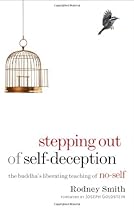Stepping Out of Self-Deception: The Buddha's Liberating Teaching of No-Self

| Author | : | |
| Rating | : | 4.72 (519 Votes) |
| Asin | : | 1590307291 |
| Format Type | : | paperback |
| Number of Pages | : | 160 Pages |
| Publish Date | : | 2015-10-26 |
| Language | : | English |
DESCRIPTION:
. Additional concrete examples and tighter editing would have made this book more approachable, but SmithÖs examination of a profound teaching is thought provoking. Copyright © Reed Business Information, a division of Reed Elsevier Inc. But even dedicated practitioners find this teaching difficult, he argues: £Through all our techniques and procedures, the sense–of-I remains the cornerstone of our existence.¥ Focusing on BuddhismÖs eightfold path, Smith tries to jolt the reader out of this £belief in a separate self.¥ He emphasizes the importance of discovery and experimentation, following the BuddhaÖs dictum of testing principles rather than accepting dogma.
FRESH AND CLEAR Russell Smith I borrowed this book from the library and have been reading it slowly and savoring it. I realize I will have to buy it so I can reread it, underline passages and take the insights deeply to heart-- it is that sort of book.True, as a previous reviewer mentioned, it is not easy reading, but I value this. Rodney Smith has made the effort to use language that actually corresponds to his . A Rare and Valuable Addition to Buddhist Teachings Michaelinwa I was very eager to read this book because I admire Rodney Smith as a teacher. He brings a unique perspective to Buddhist practice, and is often very thought provoking. However, I do find many of his lines of thought to be very complex, and not readily understood. I would consider myself an average meditator with about average exposure to Buddhist ideas. I am not, as a rule, intimida. "I felt like my brain had to just stop and let Rodney's" according to roses. Every sentence has such depthsuch clarity.I felt like my brain had to just stop and let Rodney's concepts sink in. Amazing book.not for the faint of heart, and maybe a challenge to beginners though I am a beginner, and loved this book.
. Rodney Smith is the founding and guiding teacher of the Seattle Insight Meditation Society and a guiding teacher of the Insight Meditation Society, Barre, Massachusetts. He leads classes and retreats throughout the United States. He is also the author of Lessons from the Dying, a book that grew out of the many years he spent in hospice wor
Smith shows that understanding this truth can change the way you relate to the world, and that the perspective of selflessness is critically important for anyone involved in spiritual practice. Anatta is the Buddhist teaching on the nonexistence of a permanent, independent self. Even in its present existence, it’s more a temporary arrangement of components rather than something solid. Anatta is a truth the Buddha considered to be absolutely essential to his teaching. It’s a notoriously puzzling and elusive concept, usually leading to such questions as, “If I don’t have a self, who’s reading this sentence?” It’s not that there’s no self there, says Rodney Smith. It’s just that the self that is reading this sentence is a configuration of elements that at one time did not exist and which at some point in the future will disperse. Seeing it can be the key to getting past the idea that spirituality has something to do with self-improvement, and to accessing the joy of deep insight into reality
